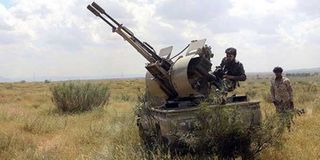World powers divided over UN call for Libya ceasefire

Fighters loyal to Libya's Government of National Accord (GNA) hold a position west of the city of Aziziah, some 60 kilometres southwest of Tripoli on April 14, 2019. The UN Security Council was divided Wednesday on how to address the crisis in Libya. PHOTO | MAHMUD TURKIA | AFP
What you need to know:
The divisions among world powers deepened as Tripoli struggled to recover from the heaviest fighting since an offensive was launched
United Nations
The UN Security Council was divided Wednesday on how to address the crisis in Libya after fresh negotiations on a draft resolution demanding a ceasefire in Tripoli failed to yield agreement.
Germany, which holds the council presidency, called for an urgent meeting after Tripoli witnessed the heaviest fighting since commander Khalifa Haftar launched an offensive to seize the capital nearly two weeks ago.
The council was due to meet Thursday to hear a briefing on the situation on the ground and "consult on the way forward," according to a note sent by German diplomats and seen by AFP.
DIVISIONS DEEPEN
The divisions among world powers deepened as Tripoli struggled to recover from the heaviest fighting since an offensive was launched nearly two weeks ago.
At least 174 people have been killed and more than 25,000 displaced since Haftar ordered his forces to march on Tripoli on April 4, according to UN figures.
"Tripoli witnessed the heaviest fighting since the outbreak of clashes, with indiscriminate rocket fire on a high-density neighbourhood in the Libyan capital," said UN spokesman Stephane Dujarric.
DISPLACEMENT
"In the past 24 hours, we've also seen the highest single-day increase in displacement, with more than 4,500 people displaced," Dujarric added.
Britain has put forward a draft resolution calling for an immediate ceasefire and de-escalation but Russia threw up concerns over language that criticized Haftar's offensive as a threat to Libya's stability.
A slightly watered-down version was put forward by Britain on Wednesday but the three African countries on the council – Equatorial Guinea, Ivory Coast, South Africa – blocked it.
Russia also said the proposed measure even after it was amended was "still far away from accommodating our concerns," according to a note from the Russian mission seen by AFP.
Haftar, seen by his allies Egypt and the United Arab Emirates as a bulwark against Islamists, has declared he wants to seize the capital, now controlled by a UN-recognised government and an array of militias.
GRAVE CONCERN
Haftar backs a rival administration based in eastern Libya that is refusing to recognise the authority of the Tripoli government.
The revised text did not single out Haftar's forces, but instead expressed "grave concern at military activity" near Tripoli, "including the launching of a military offensive by the LNA," Haftar's self-styled Libyan National Army.
The three African countries insisted that there be a reference to an African Union statement on the need for all parties fighting in Tripoli to protect civilians including migrants and refugees, according to documents seen by AFP.
US DRAGGING FEET
Britain had hoped to hold a vote before Friday, but that now appeared unlikely.
Diplomats said the United States appeared to be dragging its feet in pushing for a quick adoption of the draft resolution.
The proposed measure would echo a call for a ceasefire by UN Secretary-General Antonio Guterres, who was in Libya to personally advance prospects for a political solution when the offensive was launched.
Haftar's offensive forced the United Nations to postpone a national conference that was to draw up a roadmap to elections, meant to turn the page on years of chaos since the 2011 ouster of Muammar Gaddafi.





